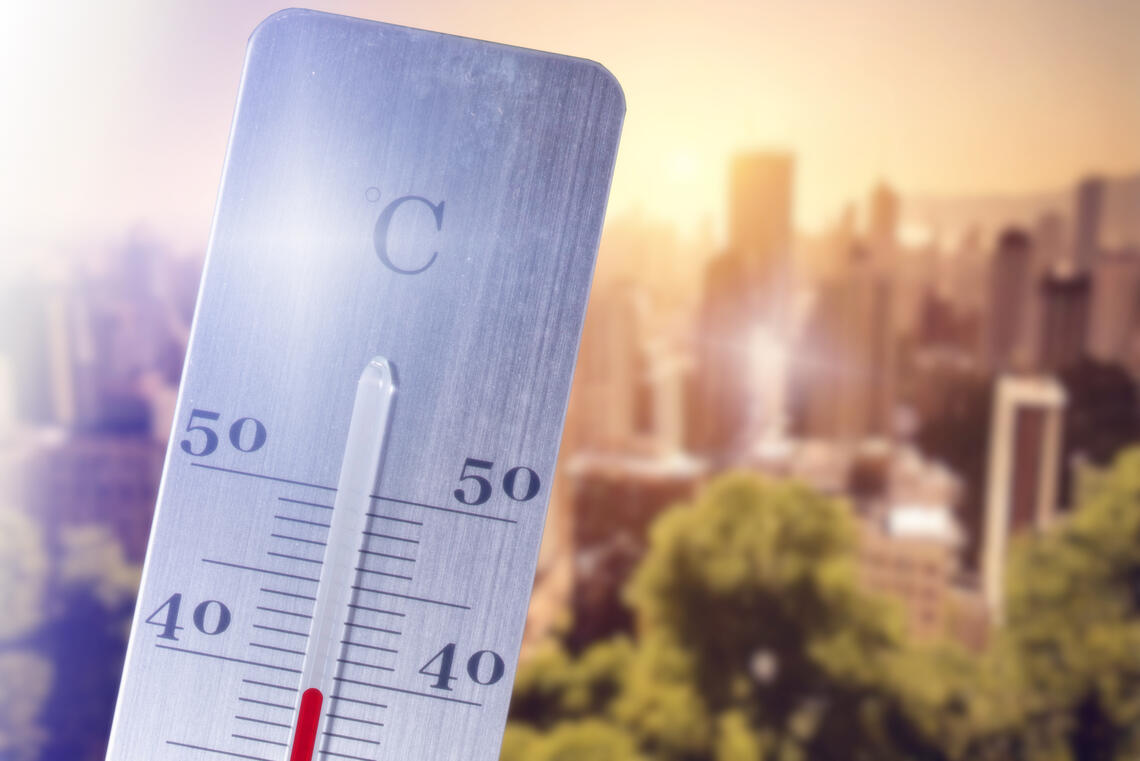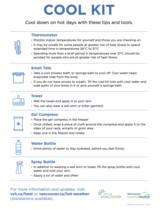E2A: Extreme Heat
Helping You Beat the Heat

adobe stock image
Hot weather can be dangerous for your health—especially during heat waves, which are getting longer and hotter due to climate change. Heat can make you feel sick quickly and can be life-threatening if not treated. But the good news is that heat-related illness is preventable with planning and anticipation.
Evidence-based Recommendations:
- Keep your home cool:
- Passive cooling techniques use natural airflow and shading to cool buildings without relying on mechanical cooling systems, like air conditioning.
- Block the sun by closing awnings, curtains, or blinds during the day.
- For passive cooling: if possible, open windows (preferably opposite walls to generate a cross-breeze) at night to let cooler air into your home.
- For mechanical (active) cooling: make sure your air conditioner or heat pump is working.
- Avoid using your oven if possible.
- Stay cool:
- If you cannot cool your home, or do not have a home, spend time in shaded or air-conditioned places (like libraries or malls or local cooling centres).
- Take cool showers or baths.
- Do not leave people or pets in a parked vehicle in the heat.
- If you work or exercise in the heat – take regular breaks in a cool space/shade.
- If you sleep outside during the day, try to sleep in the shade (remember that shade moves with the sun).
- Proper use of fans:
- Fans do not cool air, they just move air around.
- Fans will only help cool you in low humidity.
- Use your fan in or next to a window.
- Use a fan to bring in cooler air from outside
- Don’t use a fan to blow extremely hot air on yourself. This can cause heat exhaustion to happen faster.
- Drink water often: Even before you feel thirsty. Avoid alcohol, sweet drinks, or too much caffeine, all which can dehydrate you.
- Check in on others: Especially older relatives, neighbours, or anyone who lives alone.
- Know the signs of heat illness: Dizziness, headache, fast heartbeat, nausea, confusion, red or hot skin. If you feel unwell in the heat—get to a cool place and get help.
- Wildfire smoke and extreme heat: during periods of combined smoke and heat, limit your time outdoors as much as possible. It can be challenging to know if you should open your windows for cooling or close them for the smoke. Protecting yourself from heat is the immediate priority. Use a good quality air filter in your ventilation system if you have this options.
- Talk to your doctor or pharmacist: Some medications can make it harder for your body to handle heat. Ask your doctor if yours do.
Context:
- Heat wave (or extreme heat event): A heat wave is a period of temperatures higher than what is normally expected (based on historic climate averages), and includes periods where it does not cool down at night. Heat waves may span several days to several weeks.
- Canada is warming twice as fast as the global average, and Canada’s Arctic is warming nearly four times as fast
- Climate change increases the frequency of extreme heat, makes heat waves move more slowly, and results in more frequent and severe heat domes
- Humidity prevents your body from cooling off: Humid hot days are more dangerous than dry heat since sweat has a harder time evaporating into the air and cooling you
- In the 2021 B.C. heat dome, most of the people who died were older adults living alone without air conditioning
- Children, older adults, pregnant people, people with long-term health conditions (like heart, lung, or kidney disease), and people experiencing homelessness are at higher risk of health complications and injury during hot weather
- Environment and Climate Change Canada (ECCC) issues province- and region-specific weather-related alerts (such as heat warning and special air quality statements) through the WeatherCAN app or at http://weather.gc.ca.
Resources
Click to save these resources to help you beat the heat.

Infographic: Staying healthy in the heat

Three way to protect you and your loved ones during an extreme heat event

Be prepared for extreme heat

Watch for signs of heat illness

Prepare for an Emergency: During extreme heat – Cooling locations in Calgary


